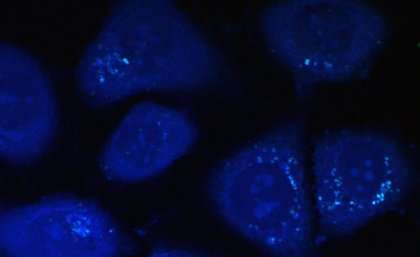Study reveals cholesterol link in aggressive cancers

University of Queensland research has revealed how fats – including cholesterol – could increase the progression of aggressive cancers.
UQ Diamantina Institute study leader Associate Professor Michelle Hill said the findings offered potential new treatment strategies and targets.
"Our previous research showed a high cholesterol diet increased the spread of prostate cancer tumours to lymph nodes, lungs and bones," Dr Hill said.
"The new study has extended the results to melanoma, breast, ovarian and kidney cancers by analysing published data sets."
Dr Hill said cholesterol and other fats were essential components of cell membranes, and played a role in regulating processes such as cell migration and division.
"Cholesterol makes specialised membrane regions which are important regulators of cell function, and our laboratory has been investigating how these membrane regions increase cancer progression," Dr Hill said.
"By comparing data published by other research groups using melanoma, breast and kidney cancer models, we were able to identify common mechanisms associated with increased cancer progression.
"Interestingly, the amount of cytoskeleton (cell skeleton) proteins at the cholesterol membranes are elevated in more aggressive cancers in all models."
The cytoskeleton is a network of fibres connecting parts of the cell, which plays an important role in structural integrity.
"Some chemotherapy drugs work on breaking up the cytoskeleton, notably the taxane family of drugs including docetaxel.
"Because of its importance in all cells, targeting the cytoskeleton leads to toxicities and side effects for patients.
"If we can identify a specific cancer-associated change in cytoskeleton, then more specific therapies could be design to kill cancer without affecting normal cells."
Dr Hill said the group's previous study on prostate cancer had revealed a reduction in the cytoskeleton-cholesterol membrane link when a gene that supresses tumour growth was activated.
"When we tested a completely unrelated tumour suppressor gene in an ovarian cancer cell model, we again found a correlation between reduction of cytoskeleton-cholesterol membrane linkage and cancer properties."
The team will now follow up on the specific molecules responsible for increasing cytoskeleton-cholesterol membrane linkage in cancer.
Dr Hill said the research reinforces the importance of cancer patients maintaining low cholesterol levels, in consultation with their clinicians.
More information: Anup D Shah et al. Integrative analysis of subcellular quantitative proteomics studies reveals functional cytoskeleton membrane-lipid raft interactions in cancer, Journal of Proteome Research (2016). DOI: 10.1021/acs.jproteome.5b01035
















